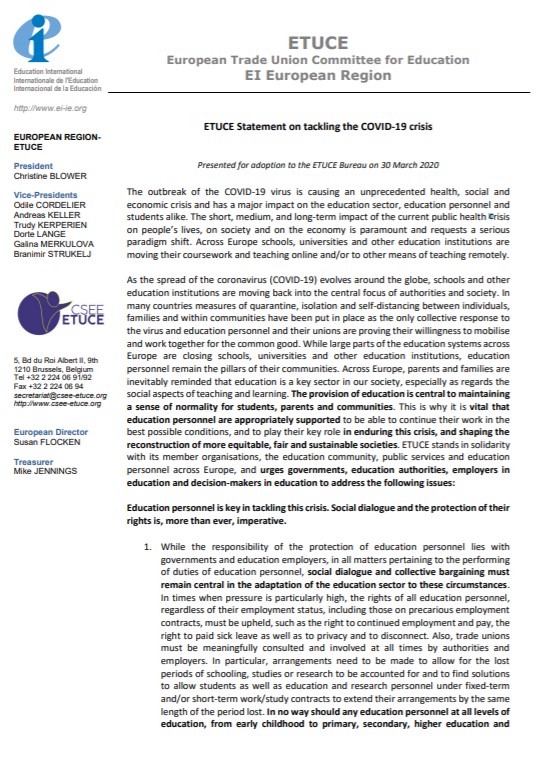ETUCE's COVID-19 Statement: an immediate crisis and troubling long-term questions
02 April 2020
The COVID 19 outbreak is a public health crisis quite different than anything Europe has faced for many years. As education personnel and their trade unions grapple with the outbreak, we are supporting and informing member organisations in any way we can.
- Long COVID-19: What challenges for education trade unions across Europe?
- ETUCE study on Education Trade Unions in Europe facing COVID-19 Omicron Variant
- Well-being of academics and researchers in the Netherlands: who did COVID-19 affect the most?
- Belgium: Education is essential! Truly?
- Education and Training Monitor 2021 sheds light on well-being during COVID-19
- Education trade unions building capacity for renewal beyond COVID-19
- Romania: Success in the negotiations for a vaccination agreement
- UK Study found stress and anxiety of academics above national average during COVID-19 pandemic
- Latvia: the impact of the pandemic on teachers is extremely worrying
- French study: the psychosocial impact of COVID-19 on researchers

- COVID-19 has unleashed an unprecedented health, social and economic crisis across Europe.
- In education, the impact on students, staff and systems is enormous. Teachers and other education personnel are adapting fast to support their learners and their communities, but the negative consequences for the quality and fairness of education could last for years.
- What is worse, this situation has shone a light on the fundamental flaws in the way European countries have been managing their public services – including education. We need a radical rethink of Europe’s chronic underinvestment in public services.
- Education trade unions representing millions of workers stand together to demand meaningful support for education personnel and institutions.
The European Trade Union Committee for Education (ETUCE), representing 132 education trade unions and 11 million workers in 51 countries, has a unique overview of the COVID-19 crisis. Our new statement makes clear the impact of the outbreak on public education systems, societies and economies across Europe. The immediate fight against the virus is ongoing, requiring unprecedented school closures and adaptations in educational practice. Meanwhile, questions about the long-term impact on citizens, workers and public services are now starting to emerge. Education trade unions across Europe call for a thorough reflection on what this crisis has taught us, with strong political and economic measures to mitigate its catastrophic consequences for education and society as a whole.
One thing is immediately clear: education personnel are still striving to serve their communities and provide all students with the best possible education. This is despite enormous challenges related to the sudden shift to remote and online teaching, insufficient and unequal access to required support, and the stress of confinement and sickness. In particular, public services like education are now faced more acutely than ever with the consequences of a decade of cuts and austerity. Budgetary decisions at national and European level have left teachers and education personnel stripped of resources, coping with staff shortages and struggling to endure the strain of the current crisis. In some countries, education workers themselves are now falling victim to attacks on their contracts and workers’ rights in the wake of COVID-19 response measures.
The vital social role of education systems and their workers is now apparent to everyone. Attempts to shift to online and distance teaching are reminding families just how skilled education professionals are, underlining that teacher-learner interaction is essential in quality education. This is especially true for learners whose special educational needs or difficult home environments make self-directed or parent-supported learning impossible. In many countries, schools are still open running a basic service to watch over vulnerable children and those whose parents are still at work – putting education personnel and their own families at risk of infection.
Education workers and their efforts warrant applause, but education trade unions will not be satisfied with praise and idle words. ETUCE President Christine Blower insisted that “the ETUCE and its member organisations demand reinforced protection of education workers’ rights, contracts and remuneration. We also demand urgent publicly funded support for education personnel coping with new methods and defending vulnerable students. This health crisis must not become a crisis for quality education, social justice or teachers’ wellbeing.
“Looking ahead,” she continued, “education trade unions also call for a paradigm shift in Europe’s economic and political priorities. The responses we choose today will determine the world we will live in tomorrow. And it must not open the door to further privatisation and commercialisation of our education systems. Austerity and neoliberal education policies have caused terrible damage over the past decade, undermining equality in education and driving many teachers from the profession. Let’s ditch this dogmatic belief that the market is a more efficient and effective way to deliver vital public services and end the systemic underinvestment in education and the gradual suffocation of our public sector.”
The immediate response of Europe’s education systems to the COVID-19 outbreak will set the tone for the years to come. Education trade unions are united in our call to place human dignity, fairness, solidarity and the public need at the heart of our decisions, not private greed or failed neoliberal ideologies. We are experts on the daily realities of education in Europe, and we stand ready to play our role in rebuilding more equal and sustainable education for all.
Notes to editors
The European Trade Union Committee for Education (ETUCE) represents 132 Education Trade Unions and 11 million teachers in 51 countries of Europe. ETUCE is a Social Partner in education at the EU level and a European Trade Union Federation within ETUC, the European Trade Union Confederation. ETUCE is the European Region of Education International, the global federation of education trade unions.
Our COVID-19 hub offers a trade union perspective on the impact of the outbreak on European education systems and their staff, with a variety of stories about individual countries.
For further information or interviews, contact:
Bryn Watkins
Communication Officer
This email address is being protected from spambots. You need JavaScript enabled to view it.
+ 32 478 79 38 95
